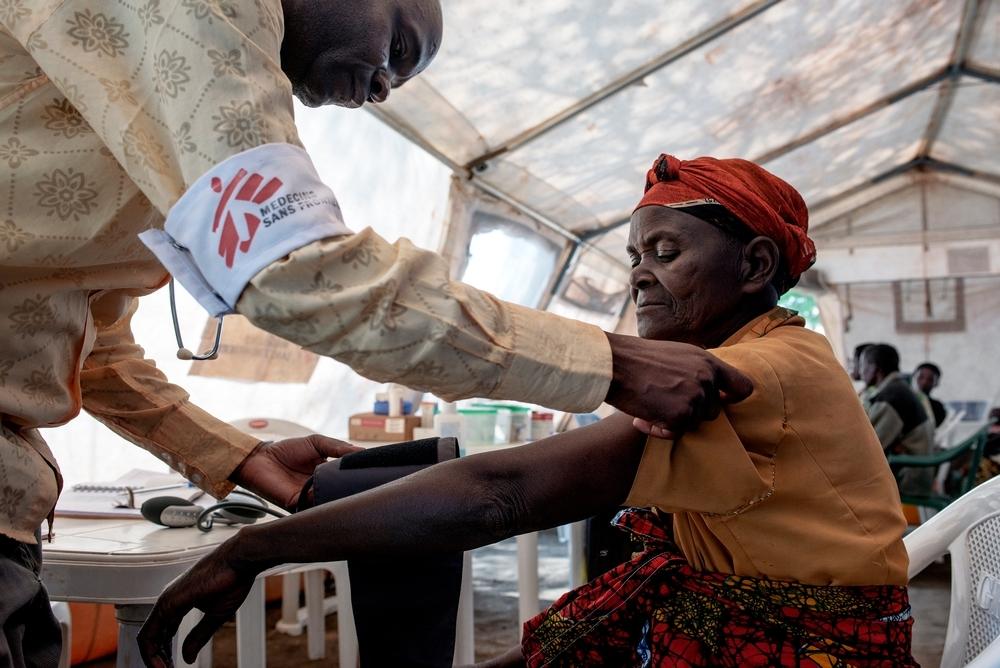Types of healthcare activity
Rapid and effective response to emergencies is at the core of what we do.
Médecins Sans Frontières/Doctors Without Borders (MSF) often hits the headlines when an emergency dominates the news, such as an earthquake, tsunami or conflict.
But we constantly deliver humanitarian aid projects – from disaster response to long-term medical programmes – which can stretch over decades.
Emergency response
We can respond to emergencies extremely quickly. When a devastating earthquake hit Haiti in 2010 our teams treated the first casualty within minutes.
We already had staff in the country and they immediately helped victims of the disaster, despite damage to all of our medical facilities, as we geared up for a full emergency response.
Even if we are not active in a country we can deploy within hours. MSF has developed pre-packaged disaster kits, including a complete surgical theatre, an obstetrics kit and an inflatable hospital. These kits are now used as models by emergency relief organisations worldwide.
Specialists
We have logistics centres and warehouses around the globe. Here we buy, test and store equipment including Land Cruiser 4X4s, communications material, power supplies, water-processing facilities and nutritional supplements.
We also store thousands of tents, shelter kits and other non-perishable items. Planes can be loaded and flown into crisis areas within 24 hours.
Permanent emergency teams work in our headquarters. These experts deploy to coordinate our response and assess the needs as soon as the disaster strikes. They then call up experienced MSF staff from a pool. These people can be on the ground within days.
Access to healthcare
Not everything strikes without warning; some disasters are slow. They unfold over decades as a disease devastates a population, instability undermines the health system or people are actively excluded from care.
Also, after a rapid emergency subsides people can find it difficult to access healthcare as the area struggles to recover, the government is overwhelmed by the scale of a crisis or new health problems are sparked, such as cholera outbreaks when clean water supplies are disrupted.
In these cases, MSF works to give people access to health care and to tackle diseases which need long term treatment, such as HIV/AIDS, tuberculosis and neglected tropical diseases like sleeping sickness.
Long-term care
Our teams may provide day-to-day healthcare for large populations, such as accident and emergency, surgery and management of chronic conditions.
In some cases there is no functioning healthcare infrastructure and we build or renovate clinics, introduce ambulance services or set up treatment programmes.
We have worked in some countries for decades. If we were to withdraw too soon the healthcare vacuum could create an emergency, forcing us to return. We work with other aid organisations and governments, when appropriate, to improve healthcare and end the threat of emergency.
Beyond medical care – advocacy
For many, MSF is synonymous with emergency medical care. But our founders were doctors and journalists; they set MSF up to treat patients and bear witness.
They hoped that by bringing abuses to light they could bring them to an end. Acting and speaking, treating and witnessing were the key words used during the creation of MSF. Today, these are still valid. This means we will speak out, either in private or in public, about the plight of populations in danger.
We also advocate for fairer access to medication. The MSF Access Campaign is based in Geneva. They challenge the high cost of existing medicines and the absence of treatment for many of the diseases affecting our patients.
Beyond medical care – research
The scope and scale of our work gives us unique access to diseases, data and the reality of delivering care in extreme situations. MSF works hard to improve the way we work and to share the results with others.
The Manson Unit is a team of experts working to improve the quality of MSF’s medical programmes.
It identifies developments in the management of medical issues such as tuberculosis (TB), HIV/AIDS, malaria and environmental contamination. The unit then helps our field projects put these changes into practice.
For 40 years, MSF has directly witnessed the human cost of the lack of drugs for neglected diseases and has raised its voice against this inequity.
In 2003, seven organisations from around the world joined forces to establish DNDi, Drugs for Neglected Diseases Initiative.
Mobile treatment
In some situations we set up mobile projects. These teams move around to make sure that as many people as possible benefit from our care. These can be attached to a fixed clinic, heading out for a day or two to visit isolated areas, or they can constantly move from place to place.
An MSF project set up in South Sudan in 2018 is now seeing 2,000 patients a month who would otherwise have gone without care, thanks to a project that reaches displaced people by boat on the Pibor River.
“Akobo and the nearby villages are almost entirely cut-off from reliable, quality healthcare,” says Raphael Veicht, MSF’s Country Manager in South Sudan.
“Because medical facilities in the area have been abandoned or repurposed for other uses, this already highly vulnerable population has nowhere to turn to for basic treatment,” he adds.
